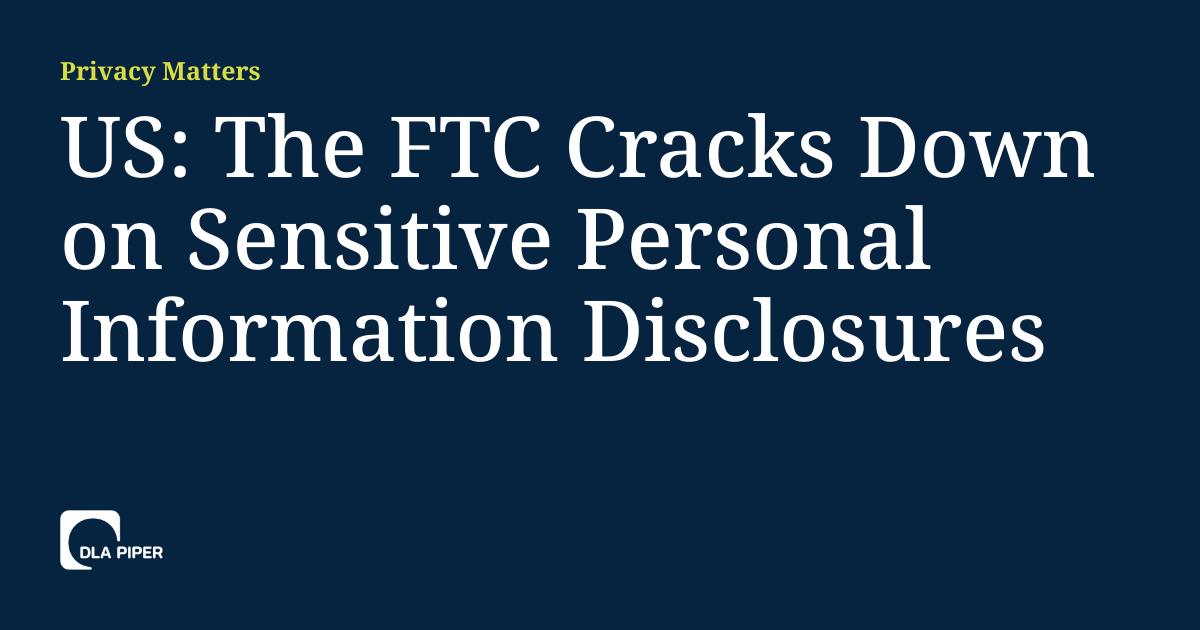The Federal Trade Commission (“FTC”) is taking bold actions to challenge business’s collection and monetization of consumers’ personal data—particularly sensitive personal data. This month, the FTC reached settlements with a data broker, X-Mode Social and its successor Outlogic LLC (“X-Mode”), and an alcohol addiction treatment firm, Monument Inc. (“Monument”), for, among other things, allegedly selling and/or sharing sensitive personal data to or with third-party advertising firms, without consent and contrary to each company’s public disclosures. These settlements are just two of several notable sensitive data-related enforcement actions by the FTC recently.
In this post, we summarize and provide key takeaways from the FTC’s enforcement against X-Mode and Monument.
I. The FTC’s Order Against X-Mode for Selling and Sharing Sensitive Location Information
The FTC reached an unprecedented settlement with data broker, X-Mode, prohibiting it from disclosing sensitive geolocation information and requiring it to delete or destroy all precise geolocation data previously collected as well as all products or services created with this data, unless it obtains valid consumer consent.
Background
In its complaint, the FTC alleges X-Mode sold precise geolocation data that could be used to track individuals’ visits to sensitive locations such as reproductive health clinics, shelters, medical clinics, or places of worship, in violation of Section 5 of the FTC Act, which prohibits companies to engage in unfair and deceptive trade practices. The FTC alleges X-Mode surreptitiously collected and sold precise geolocation data from millions of users without their consent, in violation of their privacy rights, and in direct opposition to the company’s own public representations.
In particular, the FTC alleges that X-Mode did not adequately disclose the intended use of users’ geolocation data and did not secure valid informed and affirmative consent from users prior to the data collection and/or sharing. Further, the company did not provide users of its own apps (e.g., Drunk Mode and Walk Against Humanity) with transparent notices that describe the purposes for collecting and processing geolocation information and notify that their information would be sold to government contractors for national security purposes. Additionally, X-Mode allegedly failed to honor Android users’ requests to opt-out of such data collection and provided third parties access to these users’ sensitive personal data in conflict with their privacy choices.
Despite having two of its own apps that collect geolocation information, X-Mode primarily relies on third-party app publishers to amass the location information it collects and sells. The FTC claims the company provided sample consumer notices to these third-party app publishers that misled consumers about the purposes for which their location information was being collected, used, and could otherwise be processed. The company also allegedly failed to verify that the third-party app publishers were, on their own, notifying their consumers of the relevant processing purposes and obtaining valid consent.
Additionally, the FTC alleges the company targeted consumers based on sensitive characteristics and failed to remove sensitive geolocation information from the raw location data it sold to third parties downstream. It also failed to implement reasonable or appropriate safeguards to protect against innocuous downstream uses of the location information it sold.
FTC Order Requirements
The FTC’s decision and order prohibits X-Mode from selling or sharing any sensitive location data and requires the company to:
- delete or destroy all precise geolocation data previously collected as well as all products or services created with this data, unless it obtains valid consumer consent or ensures the data has been de-identified or rendered non-sensitive.
- maintain a comprehensive record of all sensitive location data it collects and maintains, to ensure it is adequately protecting and not unlawfully selling or sharing this information.
- develop a supplier assessment program to ensure that third parties who provide location data to X-Mode:
- obtain affirmative express consent from consumers for the collection, use, and sale of their data and
- ensure that data brokers/providers are tracking and honoring individuals’ requests to opt out of the sale/disclosure of their data.
- ensure all recipients of its location data do not associate it with sensitive locations, such as medical facilities, religious institutions, shelters, schools, union offices, and immigrant service offices.
- notify the FTC within thirty (30) days of determining there was a “third-party incident,” defined as a third-party sharing X-Mode’s location data in violation of its contractual limitations.
- establish a data retention schedule and implement a comprehensive privacy program that adequately protects consumers’ personal information.
The order specifies that disclosures requesting consumers’ “affirmative express consent” must be “clear and conspicuous” and separate from any existing terms of service, terms of use, or privacy policy and someone hovering over a piece of content on a website, muting content, pausing content, or closing content will not constitute affirmative express consent.
Likewise, the FTC’s order against Monument for certain alleged disclosures of sensitive health data stipulates similar remedial measures.
II. The FTC’s Order Against Monument regarding Disclosures of Sensitive Health Data to Third Parties for Marketing Purposes
The FTC announced a proposed order, prohibiting alcohol addiction treatment company, Monument, from disclosing individuals’ health information to third-party advertising companies and platforms for purposes of targeted advertising without valid consent.
Background
In its complaint, the FTC alleges that Monument used online tracking technologies such as cookies, pixels, APIs, and other similar technologies, to collect personal data about individuals who visited and interacted with Monument’s websites and other online and subscription services. The relevant data includes name, email address, address, phone number, date of birth, IP address, government issued ID, information about alcohol consumption and medical history, device identifiers, and other relevant information about the 84,000 impacted individuals. Once collected, Monument allegedly categorized this information into ‘Custom Events’ and provided the Custom Event information along with email addresses, IP addresses, and other unique identifiers to the third-party advertisers for re-targeting and custom audience purposes, allowing advertisers to identify specific individuals for targeted advertising. The complaint further alleges that Monuments’ contracts with these third-party advertisers did not limit the third parties’ downstream use of the disclosed personal data for their own commercial purposes.
The FTC documented that Monument publicly claimed, in its privacy policy that it was fully compliant with the Health Insurance Portability and Accountability Act of 1996 (“HIPAA”) and that any information provided by individuals would be kept “100% confidential, secure and HIPAA compliant.” In addition, the policy stated that Monument would not disclose any personal data, including health information, to third parties without the individual’s written consent. Nonetheless, the privacy policy simultaneously stated that Monument would disclose personal data, including health information, to third parties including for marketing purposes.
The FTC claims that these disclosures and representations violate Section 5 of the FTC Act for misrepresentations and deceptive omissions of material facts constituting deceptive practices, and the Opioid Addiction Recovery Fraud Prevention Act of 2018 (“OARFPA”) for unfair or deceptive acts or practices related to information regarding a substance use disorder treatment service and/or product.
FTC Order Requirements
Under the order, along with imposing a (suspended) $2.5 million civil penalty and amongst other things, Monument must:
- identify all health information the company shared with relevant third parties for unlawful purposes and instruct the third-party recipients to delete such data;
- provide notice to all impacted individuals about the unlawful disclosure of their personal data, including their health information;
- not disclose any health information to third parties for advertising purposes;
- obtain an individual’s affirmative express consent prior to disclosing health information for any purpose other than advertising (which is prohibited under the order); and
- not make deceptive or misleading statements to promote its services, such as about its HIPAA compliance and its data practices.
Monument is also ordered to implement a comprehensive privacy program to protect the privacy and security of the personal data it collects, retains, and discloses. The privacy program must include:
- a privacy officer who is a designated and qualified employee that reports to a senior executive and who is responsible for the privacy program;
- regular assessments of the company’s privacy operations concerning personal data;
- adequate technical, administrative, and organizational safeguards to protect personal data, including reviews of its relevant contracts with third parties;
- a data retention policy that limits retention of personal data to the shortest time necessary to fulfill the purposes for which it was collected and the retention schedule must be made publicly available; and
- processes to maintain records of processing activities that capture the personal data that is collected on behalf of and/or disclosed to a third party.
III. Takeaways
In line with its other recent enforcement actions, these orders underscore the FTC’s commitment to restraining the collection, sale, or disclosure of consumers’ sensitive personal information. Businesses that collect, sell, or otherwise process sensitive personal information, and particularly precise geolocation information and health information, should:
- Establish and implement a comprehensive privacy program that adequately maps the company’s collection and processing of personal information and protects consumers’ personal information;
- Conduct due diligence of downstream third-party businesses and service providers to whom it discloses personal information and ensure that adequate contractual terms are in place;
- Obtain affirmative and informed prior consent from individuals for the collection, use, disclosure and/or sale of their sensitive personal data;
- Avoid sharing, selling, or otherwise disclosing sensitive geolocation data and health information;
- Ensure data providers/data brokers who supply the company with personal information are collecting informed, affirmative and valid consent from individuals and honoring opt-outs as necessary; and
- Review their data retention schedules and practices.
These orders highlight the growing importance of implementing and maintaining a comprehensive, well-rounded privacy program that goes beyond providing a cookie-cutter privacy policy, and the FTC’s willingness to increase oversight and institute significant consequences against those who don’t.
For more information about these developments and FTC enforcement in general, contact your DLA relationship Partner, the authors of this post, or any member of our Data, Privacy and Cyber security team.
DLA Piper
Please visit the firm link to site




